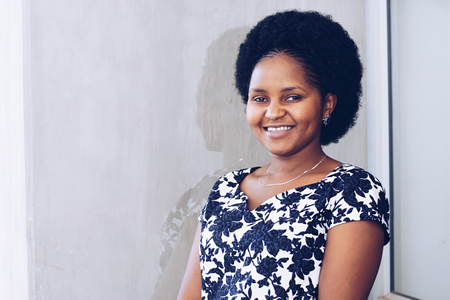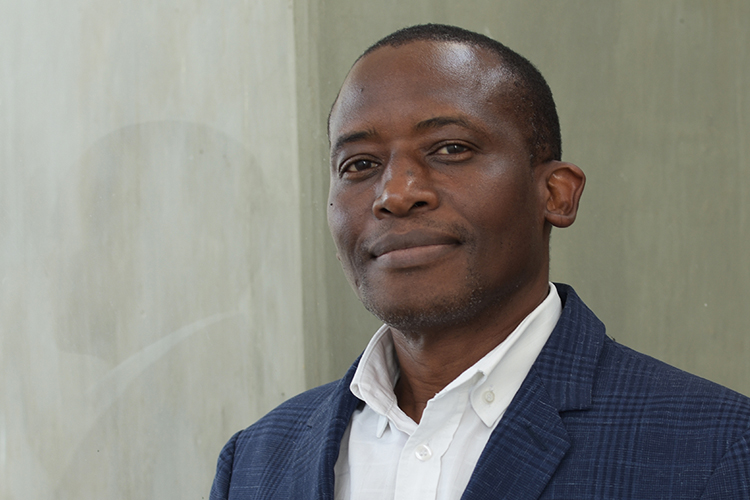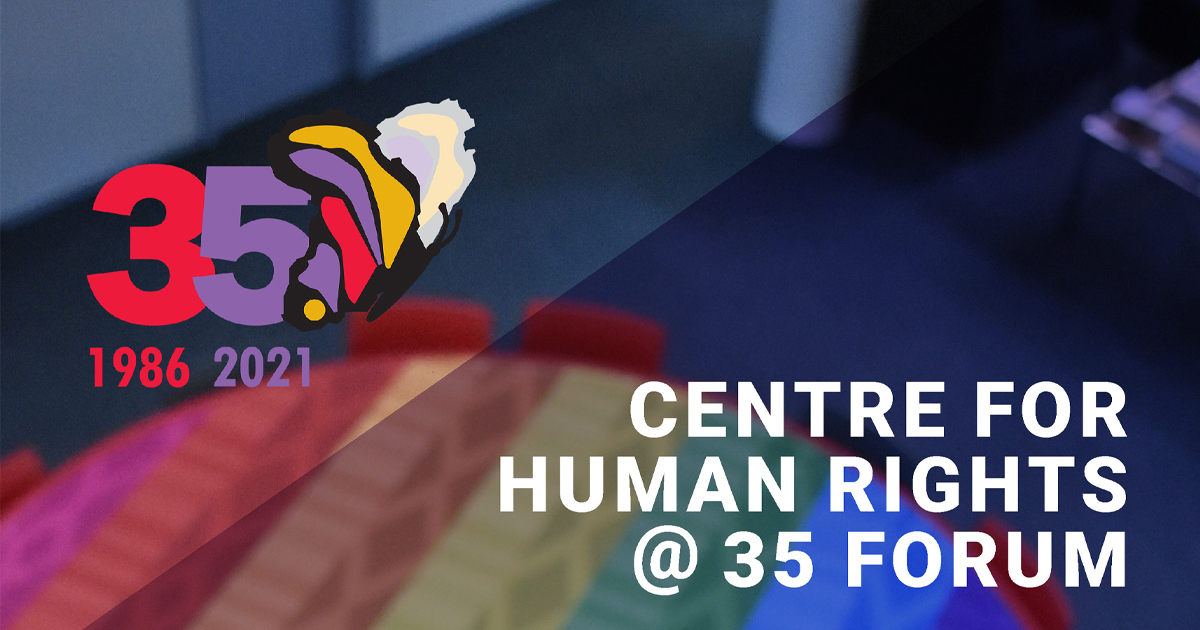The Centre for Human Rights, Faculty of Law, University of Pretoria, in 2021 marks 35 years of its existence. To commemorate this milestone, the Centre on 9 December 2021 hosted a Forum (CHR @ 35 Forum) to reflect on its main achievements and contributions; and shortcomings or missed opportunities; and to consider how the Centre needs to (re)position itself to best fit into a dramatically changing landscape relevant to human rights. Centre and Faculty staff, students, graduates, partners, donors, and other stakeholders in the work of the Centre attended this event. The event was celebrated online, connected via Zoom.
Academic programmes
In the first session of the Forum, students, teachers, and graduates of the Centre’s five academic programmes, and doctoral candidates met separately, to reflect on aspects related to these programmes (such as the curriculum content, the pedagogical approach, the alumni networks).
The Centre became an ‘official’ academic department in 2017. Before that, it presented its academic offerings under the aegis of the Department of Legal History, Comparative Law and Legal Philosophy (now, Jurisprudence). The following programmes are presented in the Centre:
- LLM/MPhil in Human Rights and Democratisation in Africa (HRDA), since 2000
- LLM in International Trade and Investment Law in Africa (TILA), since 2003 (every second year, in collaboration with the University of the Western Cape)
- LLM/MPhil in Multidisciplinary Human Rights, introduced in 2009
- LLM/MPhil in Sexual and Reproductive Rights in Africa (SRRA), present in online/hybrid format, since 2015
- LLM/MPhil in Disability Rights in Africa (DRIA), presented in collaboration with the Department of Public Law, since 2019
Centre as an ‘NGO’
The first plenary panel aimed to take stock of the Centre’s role as an ’NGO’. Lloyd Kuveya, Assistant Director (Operations), moderated this session.
Dr Farida Mamad (HRDA alumna 2009), currently advisor to the Prime Minister of Mozambique, spoke fondly of the support from the Centre during her role as a human rights commissioner in the newly constituted human rights commission of Mozambique. Farida encouraged the Centre to increase its participation as an NGO in countries around Africa, especially in Lusophone countries.
Dr Abdu Khadre Diop, Université Virtuelle du Sénégal, discussed the role of the African Human Rights Moot Court Competition (from 2022, the Christof Heyns African Human Rights Moot Court Competition) in educating and informing students and academics in Francophone universities in Africa on the institutions and norms of the African human rights system. He further acknowledged the contribution of the Centre in protecting human rights in Africa through collaboration with CSOs, for example by submitting a case to the African Committee on the Rights of the Child together with Senegalese-based NGO Rencontre Africaine pour la Défense des Droits de l'Homme (RADDHO). He suggested ways in which the Centre could reinforce its collaboration with civil society organisations in French-speaking Africa.
Roselyn Hanzi (HRDA alumna, 2006), Executive Director of Zimbabwe Lawyers for Human Rights, reflected on issues of sustainability concerning the Centre as an NGO. She proposed that the Centre should develop a sustainability plan, including a strategy to be less reliant on donor funds. She also identified new thematic areas to which the Centre may want to contribute.
Adv Bahame Nyanduga, former chairperson of the Tanzania Commission for Human Rights and Good Governance, member of the African Commission on Human and Peoples’ Rights and currently chairperson of the NGO AU Watch, spoke to the importance of establishing the Centre in South Africa in the period of apartheid. Commending the Centre for its ability to position itself as a think tank and reservoir of knowledge in Africa, Adv Nyanduga advised the Centre to build the capacity of leadership in a way that maintains its engagement with the human rights institutions and infrastructure. He also suggested that the Centre should find ways of expanding its reach to more NGOs across Africa.
Relationships/partners/partnerships
The multiple partnerships of the Centre was the focus of the second panel. In the 35 years of its existence, the Centre has forged many relationships and was only able to achieve its objectives because of the supportive relationships with too many partners to mention. In this panel, the focus fell on the intergovernmental organisations with which the Centre collaborated: The United Nations (UN) and African Union (AU). Dr Nkatha Murungi, the Centre’s Assistant Director (Programmes), moderated this panel.
One of the Centre alumni, Dr Patrick Eba, HRDA alumnus 2004, currently Deputy Director, Division of International Protection, UNHCR, emphasised the existence of a gap between UN agencies and research institutions across Africa and underlined the importance of research knowledge in Africa. Highlighting personal positive experiences working with the Centre, he highlighted areas in which the Centre can bridge this gap through partnerships with UN institutions. He noted the need for providing interns to UN entities allowing for strengthening relationships between the Centre and integrating the knowledge from the continent to UN entities.
Another Centre HRDA alumnus, 2007, Horace Adjolohoun, Principal Legal Officer at the African Court on Human and Peoples’ Rights, highlighted the impact of the Centre on the Court, through its involvement in litigation. Also, he pointed out that three of the four senior legal experts of the Court are graduates of the Centre. He urged the Centre to pay attention to the Courts of the Regional Economic Communities, in particular, the ECOWAS Court of Justice and East African Court of Justice.
The acting Executive Secretary of the African Commission on Human and Peoples’ Rights, Lindiwe Khumalo (HRDA alumna 2010), noted with appreciation the Centre’s contribution through legal ‘interns’ to the Commission. She suggested that the Centre should be more intentional in positioning its graduates for change across strategic sectors, for example by prioritising mid-career professionals who are already making an impact in their countries when admitting students for the Masters programmes. She urged the Centre to be guided by Agenda 2063 and other priorities of the AU.
A senior legal officer at the Committee of Experts on the Rights and Welfare of the Child, Ayalew Getachew Assefa (HRDA alumnus, 2011) reflected on the relationship between the Centre and the Children’s Rights Committee, which was formalised when the Centre was granted observer status. The Centre has over the years worked with the Committee in delivering its mandate, for example by submitting communications and shadow reports. Ayalew suggested that the Centre should programme its thematic issues in relation to the organs of the AU, for example through cross-cutting mandates inclusive of all relevant institutions.
Clement Mavungu (HRDA alumnus, 2006), Legal Counsel of the Pan-African Parliament, commended the Centre for working with PAP through the CSO Forum, convening civil society from across Africa to work more closely with the PAP. He called on the Centre, with its partners, to position itself to cure the weaknesses of the PAP by contributing to building a stronger PAP and enhancing the possibility of citizens monitoring and holding members of the PAP accountable.
Donors
The Centre has over the years benefited from the support of numerous donors. A number of these donors contributed to a third panel discussion, reflecting on the ever-changing human rights environment and how the Centre should adjust and re-position itself to stay relevant and able to make a meaningful impact. The Centre’s Director, Frans Viljoen, was the moderator for this panel.
The European Union has since 2000 supported the Master’s programme in Human and Rights and Democratisation in Africa (HRDA). The Centre has over the years maintained a close relationship with the EU Delegation in South Africa. Ambassador Dr Riina Kionka, currently heading the EU Delegation to South Africa, sketched some global challenges to human rights. She noted the importance of the Centre’s strong regional and continental footprint. She encouraged the Centre to maintain and strengthen its focus on the rights of the most marginalised, including persons living with HIV, sexual and gender minorities, and persons with disabilities. Ambassador Kionka also suggested that the Centre should forge closer links with CSOs in South Africa, and explore working relations with Chapter 9 institutions.
The Government of the Netherlands, through the Royal Dutch Embassy in Pretoria, has also been a long-standing donor and partner of the Centre, especially in the domain of sexual and gender rights. Speaking as part of the panel, Ambassador Han Peters emphasised the commitment of the Netherlands to reaching those who are most affected by human rights abuse and health inequality in light of COVID-19 pandemic. The pandemic has provided an opportunity to address issues of global inequality and bridge the gap between the haves and the have-nots. He urged the Centre to see an opportunity in COVID-19 and respond by protecting the rights of the most vulnerable.
The Government of Norway, though the Royal Norwegian Embassy in Pretoria, has supported the Centre over many years and in numerous thematic areas. Ambassador Astrid Halle urged that progress in human rights must be highlighted to encourage people not to give up the fight in promoting human rights and democracy, despite the enormous challenges experienced globally, in Africa and in South Africa. She pointed to a gradual shift in funding priorities towards issues related to armed conflict and the climate crisis.
The Centre has also been working in partnership with the Government of Flanders, through the Flemish Delegation in South Africa. Zvi Raman, Deputy Representative of the Flemish delegation in South Africa, pointed out that Flanders has worked with the Centre since 2012 to democratise information through three short courses open to participants from across Africa. He underlined that this collaboration involves three Flemish universities.
Wellspring Philanthropic Fund has been supporting the Centre’s work in sexual and reproductive rights and women’s rights, and also provided invaluable operational support. Dr Godfrey Odongo (HRDA alumnus 2002), participating on behalf of Wellspring Philanthropic Fund, offered insightful suggestions about how the Centre may reposition itself in a changing human rights landscape, for example by using multidisciplinary and cross-disciplinary approaches.
Thanks
The Centre has managed to accomplish much in 35 years, but only because of the support and friendship of its many partners and friends, and its growing pool of graduates who are not only advocates for human rights but also ‘ambassadors’ of the Centre. As the Centre finalises its strategic plan for the next phase, it will benefit from and be guided by the interventions made during the CHR@35 Forum, for which we sincerely thank all who have contributed. - Frans Viljoen, Director
For more information, please contact:

Tel: +27 (0) 12 420 4684
Fax: +27 (0) 86 580 5743
nkatha.murungi@up.ac.za

Tel: +27 (0) 12 420 3810
Fax: +27 (0) 86 580 5743
lloyd.kuveya@up.ac.za



